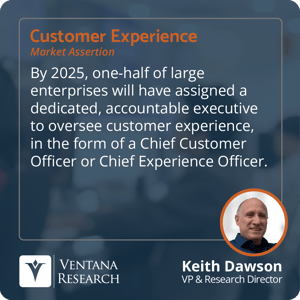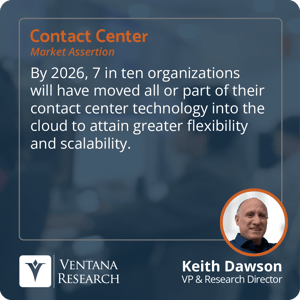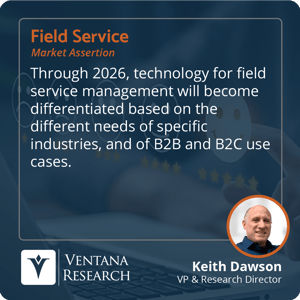Ventana Research recently announced its Market Agenda in the expertise area of Customer Experience. CX has emerged as a way for organizations to demonstrate value and stand out in the marketplace. The technology underlying modern CX is transitioning from tools that are based on communication to those centered on data analysis and process automation. This allows organizations to build great experiences and reap the benefits in customer loyalty and value. It also forces companies to reckon with the complexity and disruption that technologies like artificial intelligence and automation bring to an organization.
CX ensures consistency with a customer’s engagement and interaction. There are many stakeholders in a CX program outside of service, including marketers, sales teams, e-commerce teams, back-office workers and IT departments. Aligning these professionals.png?width=400&height=200&name=Ventana_Research_2023_Market_Agenda_Logo%20(1).png) toward common organizational goals enables successful CX planning and technology development.
toward common organizational goals enables successful CX planning and technology development.
As we begin 2023, we are encouraging organizations to invest in building internal structures to make it easier to orchestrate solid, beneficial experiences. It is important to view CX broadly, with emphasis on the agent experience and the development of analytic best practices that guide workers across teams. Everyone who is responsible for influencing customer behavior contributes to CX.
We believe that the best CX is derived from a combination of analysis of customer behavior and intent, two-way omnichannel communication and a workforce that is engaged at all levels in guiding customers to their desired outcomes. Customer experiences can be enriched through deployment of applications that provide a unified view of all interactions, supporting a well-defined and visualized customer journey and enabling more efficient operations.
Our CX Market Agenda is guided by our firm’s expertise in business requirements and our knowledge of technology vendors and products. Through our ongoing market research, we offer insights and best practices to help both line-of-business managers and IT teams across industry verticals reach their maximum potential. Our Value Index assesses technology vendors’ potential to help meet organizations’ CX needs with tools that function across departments. Our Customer Experience expertise area includes six topic areas: Agent Management, Contact Center, Field Service, Customer Experience Management, Voice of the Customer and new for 2023, Intelligent Self-Service.
In 2023, we are expanding our focus on the convergence of advanced technology at the first point of customer entry, the self-service environment. When customers have access to knowledge resources and tools that direct them to contextually relevant information, they emerge more satisfied and loyal. If they need to speak with a person as a follow-on to self-service interactions, the experience is better, thanks to both parties being more prepared. CX suites that provide both applications and platforms to deliver an automated, continuous and unified set of processes and workflows help organizations manage customer interactions and experiences across any channel or system.
We are also tracking the emergence of a new set of executives charged with overseeing the many threads of customer experience management. We assert that by 2025, one-half of large enterprises will have assigned a dedicated, accountable executive to oversee customer experience, in the form of a Chief Customer Officer or Chief Experience Officer.
large enterprises will have assigned a dedicated, accountable executive to oversee customer experience, in the form of a Chief Customer Officer or Chief Experience Officer.
Agent Management
Agent management includes processes and applications that enable agents to engage customers and deliver the best possible experience through intelligent and automated interactions. Technology is now available to enable efficient and effective collaboration among agents and managers, with tools that range from coaching and learning to the optimal scheduling and performance of work. These applications increasingly make use of conversational and mobile computing technology to automate and simplify tasks. Artificial intelligence and machine learning provide agents with qualitatively better interaction support.
It’s essential that organizations provide agents the best possible operational environment to improve customer experiences. For many, the demands of the pandemic have changed cost calculations related to agent populations. Many contact centers are wrestling with increasing budgetary demands for training and coaching due to the rigors of managing work-from-home agents and the increasing complexity of agented interactions. We are conducting Benchmark Research on agent management with contact centers to gain insights on how and what organizations are doing to improve and identify best practices. Our Agent Management Value Index helps organizations assess and select vendors and products that are the best fit.
Contact Center
The contact center is the locus of engagement with customers, regardless of the customer’s channel or device preference. Effective contact centers unify all channels of interaction through common data and consistent guidance. Effectiveness also increasingly requires the use of conversational computing, virtual assistants and digital self-service capabilities. Ventana Research asserts that by 2026, 7 in 10 organizations will have moved all or part of contact center technology into the cloud to attain greater flexibility and scalability. Organizations must embrace cloud computing to provide agile interactions across channels of engagement. Our Contact Center Value Index will be updated in 2023 to help organizations assess and select vendors and products that are the best fit.
through common data and consistent guidance. Effectiveness also increasingly requires the use of conversational computing, virtual assistants and digital self-service capabilities. Ventana Research asserts that by 2026, 7 in 10 organizations will have moved all or part of contact center technology into the cloud to attain greater flexibility and scalability. Organizations must embrace cloud computing to provide agile interactions across channels of engagement. Our Contact Center Value Index will be updated in 2023 to help organizations assess and select vendors and products that are the best fit.
Automated self-service is the technology used at the front end of a customer interaction to either route the contact to the appropriate resource or handle some or all of the customer’s inquiry on its own. Systems can be built around chatbots, may incorporate AI and machine learning and increasingly rely on complex, automated workflows to gather information or pass the interaction to the next stage while retaining appropriate context.
Intelligent Self-Service
Our focus on automated self-service takes into account the rapid expansion of conversational AI systems that capture an increasing portion of customer contact volume. It looks at how organizations move past standard interactive voice response to more sophisticated systems that contain knowledge applications, transaction processing and customer histories to control service costs.
Automated self-service is the technology used at the front-end of a customer interaction to either route the interaction to the appropriate resource, or to handle some or all of the customer’s inquiry on its own. Systems can be built around chatbots, may incorporate AI and machine learning, and increasingly rely on complex automated workflows to gather information or pass the interaction to the next stage while retaining appropriate context at each stage.
Field Service
When a customer service call leads to an onsite visit from a technician, delivery of good experiences becomes more complicated and expensive. Transmitting information from one party to another - from a retailer to an installer to a technician - can be error-prone, especially when the handoff is from one company to another. Field service tools manage the process of dispatching and tracking technicians, ensuring that, when they arrive at the customer’s site, they have the appropriate data and equipment necessary to complete the service call.
Field service has attracted considerable attention from vendors in recent years, as many try to integrate this aspect of the service process into communication and analytic infrastructures. There are also significant differences in the nature of service delivery: We assert that through 2025, technology for field service management will become differentiated based on the needs of specific industries, and of business-to-business and business-to-consumer use cases. We will be looking at the trends and IoT best practices surrounding field service during 2023.
infrastructures. There are also significant differences in the nature of service delivery: We assert that through 2025, technology for field service management will become differentiated based on the needs of specific industries, and of business-to-business and business-to-consumer use cases. We will be looking at the trends and IoT best practices surrounding field service during 2023.
Customer Experience Management
One recent trend in CX has been the gradual switch from point solutions addressing narrow aspects of the process to a broader suite approach that knits together multiple, siloed applications affecting different departments. Voice and digital interactions have spawned their own slightly different market segments, with the ultimate goal to produce a single family of applications within an organization that can slice data into different views depending on the role of the user. Customer experience management tools sometimes originate from contact center vendors with a focus on interaction handling, and sometimes from the marketing side, where they focus on audience creation, personalization and behavioral analytics.
Voice of the Customer
Voice of the customer processes and applications use feedback and sentiment along with analytics and AI to develop a unified view of the customer to enable improvement efforts. It is clear that an effective VoC program requires a solid foundation of data and analytics. Organizations should prioritize investments that will yield continuous insights on customer sentiment. We are conducting ongoing Benchmark Research on Customer Analytics, and our findings identify a number of challenges and opportunities that organizations face.
Subscribe to our Ventana Research community to stay up-to-date on our 2023 research efforts. Explore our Customer Experience expertise and topic areas for a detailed research agenda and continuously updated 90-day calendar as well as more research facts and best practices.
Regards,
Keith Dawson


.png?width=400&height=200&name=Ventana_Research_2023_Market_Agenda_Logo%20(1).png) toward common organizational goals enables successful CX planning and technology development.
toward common organizational goals enables successful CX planning and technology development. large enterprises will have assigned a dedicated, accountable executive to oversee customer experience, in the form of a Chief Customer Officer or Chief Experience Officer.
large enterprises will have assigned a dedicated, accountable executive to oversee customer experience, in the form of a Chief Customer Officer or Chief Experience Officer. through common data and consistent guidance. Effectiveness also increasingly requires the use of conversational computing, virtual assistants and digital self-service capabilities. Ventana Research asserts that by 2026, 7 in 10 organizations will have moved all or part of contact center technology into the cloud to attain greater flexibility and scalability. Organizations must embrace cloud computing to provide agile interactions across channels of engagement. Our
through common data and consistent guidance. Effectiveness also increasingly requires the use of conversational computing, virtual assistants and digital self-service capabilities. Ventana Research asserts that by 2026, 7 in 10 organizations will have moved all or part of contact center technology into the cloud to attain greater flexibility and scalability. Organizations must embrace cloud computing to provide agile interactions across channels of engagement. Our  infrastructures. There are also significant differences in the nature of service delivery: We assert that through 2025, technology for field service management will become differentiated based on the needs of specific industries, and of business-to-business and business-to-consumer use cases. We will be looking at the trends and IoT best practices surrounding field service during 2023.
infrastructures. There are also significant differences in the nature of service delivery: We assert that through 2025, technology for field service management will become differentiated based on the needs of specific industries, and of business-to-business and business-to-consumer use cases. We will be looking at the trends and IoT best practices surrounding field service during 2023.








